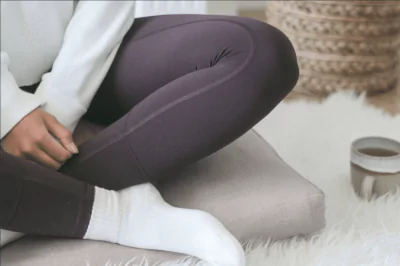Table of Contents[Hide][Show]
It’s a workday morning. I’ve hit “snooze” on my alarm for the 5th time, hoping it will magically transport me to the weekend. Reality bites, it’s Monday, not the weekend.
The additional minutes of being wrapped in the fluffy cocoon of my blanket only worsen the pain of my inevitable truth – I need to leave my home and interact with the rest of the world. I sit up in bed. Surveying my bedroom, I’m reminded of the chores that have yet to be completed.
Sound familiar?
There’s a pile of laundry that keeps growing, dishes covered in dried food, and stack of unopened mail (bills included) on my desk. I’d rather close my eyes and stay in bed for a few more days. But, I’ve exhausted my paid time off and have projects with pending due dates.
When my feet touch my cold bedroom floor, my sadness and anxiety are amplified. I want to stay in bed, but life won’t wait for me. This a snippet of my blues.
the winter blues – or whatever you want to call it
Feeling blue, depressed, or whichever description works best for your experience can make the holidays overwhelmingly exhausting. The energy required to motivate ourselves and function “normally” can be short-lived and often non-existent.
How do we care for ourselves during this time?
The term “self-care” is the advice given when we are in a “blue” emotional state. What is self care? The concise definition: acts that improve your mental, emotional, and physical health. Despite the difficulties, as described by Dr Serani, of learning what to do for ourselves and remaining consistent, self care can be an emotional life saver.
I am not a medical professional, but I have walked hand-in-hand with the blues/depression before I had a name, or understanding of what I was experiencing. With the help of medical professionals and a lot of hard work, my life has improved exponentially. In addition to all of the other blues fighting methods you may have found online—herbs, exercise, etc—I have listed my go-to hacks of managing my emotions.
1. Disconnect and Recharge
During the time of my life when I was unable to take paid time away from work, I made changes to my schedule when I knew I needed time to myself.
Rather than use transportation, I often walked all, or part, of the way home from work. My walks performed a double duty – alone time and exercise. This activity really helped with relaxing me and leaving the energy of work at work.
recharging can take many forms
I’d also switch work shifts with other employees for more days off in a row. I could disconnect from the world for an extra day or two, giving me the much needed time to recharge. Recharging included: watching TV, reading, crying, journaling, doing absolutely nothing, etc.
I limited use of social media and electronic devices, creating an environment conducive to relaxing. I know taking time for yourself is one of the toughest to achieve—especially if you have children or someone you care for on a daily basis.
Ask for help
If you have a support system, utilize them. If you have paid time off work, take time off. My rule is to always communicate with a loved one about my need to to “disconnect.”
And before I actually disconnect, I give them a timeline for when I plan to return. This makes them aware of how long you’ll be offline, and it also doesn’t allow you to be disconnected for an extended period of time.

2. Write Pain Away
Well before I realized it was a means to counteract some of the emotional effects of blues/depression, writing has been a part of my healing arsenal.
It can be difficult to articulate our pain in terms that others can understand. Or, we may not have the words because we aren’t ready to vocalize what we are experiencing. Whatever the reason for our choice to refrain from sharing our experience, journaling is extremely helpful with releasing some of the pain that weighs us down.
how sharing your experience can bring healing
As noted by author Isabel Allende, who experienced her share of trauma, she credits writing with alleviating some of her pain and frustration.
In the early part of last year, I had a miscarriage. I hadn’t taken my own advice of reaching out for help, so my depression spiraled to a depth I hadn’t experienced in a very long time. The sight of children would cause an emotional disruption, that led to tears in public spaces and withdrawing from loved ones.
the power of journaling
I began attending a group to help me work through my grief. During a session, one of the group’s attendees suggested I write to my child as part of my regular journaling. I did. I wrote as if she were in front of me, intently listening to my every word.
The feeling of a deep longing and tears I experienced when I first started this exercise, were replaced with hopefulness and smiles. Journaling really helped with my healing, enabling me to reconnect with loved ones and their children without fear of spiraling.
3. Cleanse Yourself of Toxins
By toxins, I mean people. We have different reasons and triggers for why we experience a diminished emotional state. For the cases related to our environment, the people in our life play a huge role in our emotional well-being.
Some people bring a negative energy into our space, leaving us feeling drained. Others are on a constant loop of spewing negativity via words and/or how they treat us.
setting boundaries
No matter much we love the perpetrators of negativity, boundaries are essential to our well-being. You need to figure out your limits, and hold people accountable for how they interact with you. If they choose to be repeat offenders and disregard your request, distance yourself.
This may help them gain a better understanding of your needs and how to engage with you. However, if they totally disregard your needs for the sake of their needs and agenda, pull out a pair of “life scissors” and start cutting.
you owe it to yourself
Initially, it may be difficult to cut people out of your life. But once you are in the habit of loving yourself more and experiencing a more peaceful state of being, you won’t second guess it as much. This doesn’t mean people need to gone forever. It just means people need to respect your needs, and to better with regards to how they treat you.
If you need more tips on how to set boundaries and the importance of doing so, this episode of the Therapy for Black Girls podcast may help get you started.

4. “Treat yourself”
This term great way to boost your mood when you are feeling blue. There’s no need to wait for a loved one to extend an invite for you to have a good time. Extend that invite to yourself.
If there’s an art exhibit you’ve been dying to experience, plan a visit the museum. Try the new restaurant that’s on your “places to eat” list. Or, go to the beach and watch the waves roll across the shore. From simple to extravagant, make a plan to do something that causes you to radiate warmth from the inside out.
Nisha from 21Ninety provides a few more great ideas to help jumpstart, or add to, the list of “treats” to give to yourself. You deserve the gift of feeling well and being treated well, even if the gift is from you.
know what makes you happy
Another great treat- making what I’ve dubbed a “happy list”. It is an effective way to put all of these treats in one place. It’s an easy exercise. You write down everything that makes you happy, literally everything.
From watching the way light reflects off of leaves blowing in the wind, to swimming with sharks. Write it down. This exercise can help you be more aware of this little gifts of joy in your day-to-day life.
the power of self awareness
One of my favorite pastimes is watching sunsets. If I’m not too busy after work, I grab my blanket, find a spot on the beach to watch the sunset, then I relax. I try to do this as often as I am able, and I recommend making a habit of treating yourself with small things. Knowing what makes you happy can assist in other areas of your life. Especially when re-evaluating career choices.
The “happy list” has worked wonders for me, and ultimately helped me navigate my current career path. I have a ways to go before I reach the level of success I know I will earn, but knowing I’m on the track feels awesome.
5. Reach when Out Needed
This step is super important. There is no shame in asking for help when you’re feeling blue. Feeling supported by loved ones serves as a reminder that you don’t need to walk the path alone. Support comes in many forms.
Where to find help
Often times, just having someone who will listen can be extremely helpful. But if you aren’t ready to share, or don’t have a support system, find one. Religious spaces, support groups, meet ups, or your medical provider are all great places to start.
There are online services, as well as free to low cost options in your area. An online search may lead you in the right direction.
don’t be afraid to meet with a professional
If you believe your emotional state is too much to handle, seek professional help asap. I’m a huge supporter of taking to a professional. They are equipped with education and tools that will point you in the right direction. They are a great resource with helping you learn your triggers, and teaching you how to manage them.

keep an open mind
When trying methods of managing your mood, try to approach them with an open mind. But also understand there is no magic cure-all. Don’t expect to perform a step once and be cured of whatever is ailing you. Sometimes a routine needs to be developed before results are seen, and they may not necessarily be permanent.
Emotional management can be complicated and requires consistent upkeep. It isn’t easy, but the outcome can be an improved quality of life. Stay the course, and love yourself unconditionally.
Sources:
https://www.psychologytoday.com/us/blog/two-takes-depression/201702/why-self-care-is-hard-depressed-individuals
https://www.bbc.com/news/av/entertainment-arts-46293499/isabel-allende-i-get-over-grudges-by-writing
https://21ninety.com/5-dates-for-me-myself-and-i
https://www.urmc.rochester.edu/encyclopedia/content.aspx?ContentID=4552&ContentTypeID=1
https://www.therapyforblackgirls.com/session-86-gift-boundaries/
https://suicidepreventionlifeline.org/








What helps you keep away the winter blues? Let us know in the comment section.